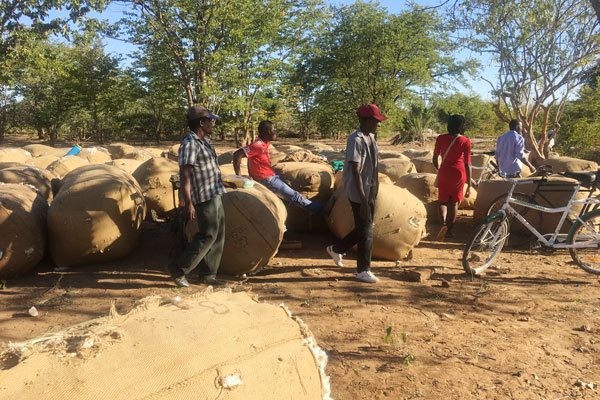
BY MTHANDAZO NYONI
AS Zimbabwe grapples with high levels of unemployment, conflicts between farmers and miners over land use and resources are escalating, curtailing production in the process.
Farmers accuse miners of destroying their pastures, leaving open pits and exposing livestock and human beings to injury as well as destroying the environment.
Miners, on other hand, justify their operations as in-line with mining rights as enshrined in the Mines and Minerals Act.
They also accuse farmers of trespassing into their premises when selling their wares and sometimes poaching their minerals.
The conflicts, according to the Zimbabwe Environmental Law Association (Zela), are much more pronounced in areas such as Insiza, Bikita, Matopo, Chimanimani and Chipinge.
While the feud rages on, production in both sectors suffers.
Government recently launched the agriculture and food systems transformation strategy, which seeks to achieve a US$8,2 billion agriculture economy by 2025.
- Chamisa under fire over US$120K donation
- Mavhunga puts DeMbare into Chibuku quarterfinals
- Pension funds bet on Cabora Bassa oilfields
- Councils defy govt fire tender directive
Keep Reading
In 2018, it also launched the US$12 billion mining industry strategy.
But with farmer-miner conflicts raging on, it could be difficult to achieve these visions, hence, the urgent need to solve them.
In a bid to solve these disputes, civic organisations and local authorities, have stepped in to engage the miners and farmers.
The two civic organisations, Zimbabwe Project Trust (Zimpro) and Zela working with local authorities, in June 2019 facilitated an inception dialogue meeting between the farmers and miners in Filabusi’s Killarney mining area in ward 17 as a pilot project.
The meeting sought to come up with strategies that would allow co-existence between farmers and miners as both parties conduct their business.
Addressing delegates attending the Zimbabwe Alternative Mining Indaba (Zami) held in Bulawayo last week, Insiza Rural District Council human resources and environment projects manager Pardon Moyo said the intervention by Zimpro and Zela had started bearing fruits.
“After these engagements, we have seen positive relationships between farmers and miners.
“For instance, one miner provided a water system for the farmers’ livestock free of charge.
“Another miner always informs the farmers whenever there are cases of timber and firewood poaching,” Moyo said.
“We are still facilitating a good and strong relationship between the two groups until at a point when we feel that the two groups are fully managing their own affairs.”
In the meeting, it was agreed that miners should engage farmers whenever they need any resources other than minerals within or outside their claims and they should pay for such resources if ever they wanted to use them.
It was also agreed that miners should always rehabilitate their mined areas in order to prevent possible danger to both humans and livestock.
On the other hand, farmers should seek authority to sell their wares in the miners’ premises as well as seek authority to mine in the miners’ claims, not to poach gold especially with metal detectors.
After a prolonged discussion, Moyo said it was realised that miners and farmers needed each other.
For instance, farmers need income from miners for various household expenditures while miners need foodstuffs, timber, firewood from farmers.
Moyo said several tools or methods to strengthen the relationship were being pursued.
These include the use of environment sub-committees (ESCs) at zonal levels, the use of the Traditional Leaders Act in solving environmental or resources utilisation disputes as well as the use of the Campfire concept to attach benefit in resources management.
ESCs, whose mandate is to manage and protect the environment, act as an interaction tool between farmers and miners making sure that each group sticks to agreed issues.
If the pilot project succeeds in Killarney, it would be implemented in other areas where there are farmer-miner conflicts.
During a Zami session, it was noted that the clashes between farmers and miners were rooted in the Mines and Minerals Act, which farmers say places greater value on gold prospecting than farming.
A Bill to amend the Mines and Minerals Act, which first went into effect in 1961, has been stuck in Parliament since 2015.
There are more than 61 proposed amendments, which include reconstitution of the mining affairs board and a list of changes that would improve miner and farmer relations such as compensation for farmers when miners encroach on their land.
Delegates urged the government and Parliament to expedite the finalisation of the Bill as well as the Ministry of Mines and Mining Development to come up with a balanced policy, which covers both farmers and miners to reduce conflicts.
Environmental Management Agency Insiza district environment officer Mgcinisihlalo Ndlovu, whose organisation also works with Zela and Zimpro, said they were using existing legislation and legal framework to resolve conflicts and safeguard the interests of all inhabitants.
In discharging their duties, Ndlovu said ESCs were facing challenges such as limited resources (human, financial and material), little or no support from existing structures, no arresting powers on offenders, no identity or visibility and no incentives.
Dorcas Matsenyengwa, a Ministry of Lands, Agriculture, Water and Rural Resettlement official, said there was need for miners and farmers to work together for the benefit of the nation.
For instance, she said farmers and miners could form partnerships to either pursue farming or mining enterprises.
“In mining areas, smallholder farmers can co-exist with the miners and everyone should be responsible to avoid environmental degradation,” Matsenyengwa said.
“Farmers are partnering with mining companies to pursue farming enterprises whilst carrying out their operations underneath.
“This can be part of their community share ownership trust programmes or corporate social responsibility to empower the local community.”
Agriculture contributes approximately 17% to Zimbabwe’s gross domestic product while the mining sector is estimated to be accounting for between 12% and 16%.











